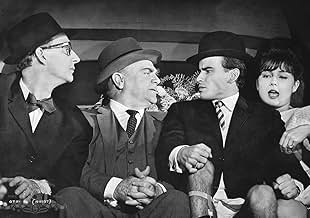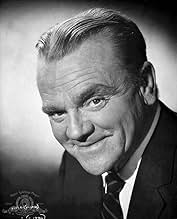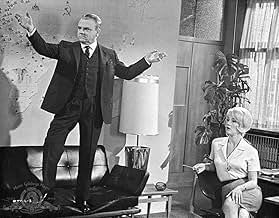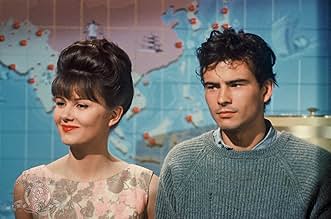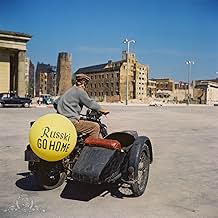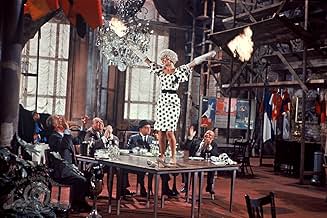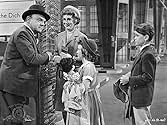NOTE IMDb
7,8/10
24 k
MA NOTE
À Berlin-Ouest pendant la guerre froide, un cadre de Coca-Cola est chargé de s'occuper de la fille de son patron.À Berlin-Ouest pendant la guerre froide, un cadre de Coca-Cola est chargé de s'occuper de la fille de son patron.À Berlin-Ouest pendant la guerre froide, un cadre de Coca-Cola est chargé de s'occuper de la fille de son patron.
- Réalisation
- Scénario
- Casting principal
- Nommé pour 1 Oscar
- 1 victoire et 8 nominations au total
Liselotte Pulver
- Fräulein Ingeborg
- (as Lilo Pulver)
Loïs Bolton
- Melanie Hazeltine
- (as Lois Bolton)
John Banner
- Krause
- (voix)
- …
Christine Allen
- Cindy MacNamara
- (non crédité)
Avis à la une
When I saw this one during its first-run release, I recall finding its relentless pace rather irritating and wasn't savvy enough at the time, I guess, to catch everything that Billy Wilder and his scriptwriters packed so tightly into its running time.
But it was shown (letterboxed - "The only way to fly!") on Turner Classic Movies the other night and I quite enjoyed it, since it may now be enhanced somewhat at today's distant remove from the politics and the contemporary references of its period.
Cagney's performance is really amazing and it's not so surprising that this was his last major film role on the big screen. He must have been exhausted when filming wrapped!
The rest of the cast seems to be thoroughly in the service of what Wilder intended, which certainly wasn't subtlety, to say the least. And the production values and behind-the-scenes contributions (especially Andre Previn's witty score) are Class "A" all the way (except for that flat-looking studio mock-up of the air terminal interior, apparently necessitated by problems that couldn't have been foreseen).
It's not Wilder's best but it's a cut above (and then some) so much of the stuff that passes for comedy on the multiplex screens today.
But it was shown (letterboxed - "The only way to fly!") on Turner Classic Movies the other night and I quite enjoyed it, since it may now be enhanced somewhat at today's distant remove from the politics and the contemporary references of its period.
Cagney's performance is really amazing and it's not so surprising that this was his last major film role on the big screen. He must have been exhausted when filming wrapped!
The rest of the cast seems to be thoroughly in the service of what Wilder intended, which certainly wasn't subtlety, to say the least. And the production values and behind-the-scenes contributions (especially Andre Previn's witty score) are Class "A" all the way (except for that flat-looking studio mock-up of the air terminal interior, apparently necessitated by problems that couldn't have been foreseen).
It's not Wilder's best but it's a cut above (and then some) so much of the stuff that passes for comedy on the multiplex screens today.
One, Two, Three is from the fertile mind of Billy Wilder where Cold War politics gets reduced to the absurd. This film is so fast and so funny it's only a few steps from Monty Python.
For what was and what should have remained his swan song to the world of film James Cagney heads the cast in this. He's the man in charge of Coca-Cola's operations in Germany which is headquartered in West Berlin and he's had a lovely little present dumped in his lap. The daughter of the CEO of Coca-Cola is in Europe and now she's in Germany and he's expected to watch out for her. The daughter is played by Pamela Tiffin and she is one of the biggest airheads ever portrayed on the screen. She's fallen big time for a German kid played by Horst Bucholtz. They've gotten married.
Bucholtz is a kid who's real good at spouting all kinds of left wing slogans without delving to deeply into their meanings. He's a Communist and that drives Cagney nuts and if it drives Cagney nuts, Tiffin's father is sure to go over the top. Cagney takes it upon himself to get Bucholtz arrested on the East Berlin side as an American spy.
Of course a small memento of their married life has developed inside Tiffin so now Cagney has a real problem. He's got to get Bucholtz back and turn him into a money grubbing capitalist in his image. The frantic pace at which this is attempted, racing against the clock when Tiffin's father played by Howard St. John arrives in Berlin is what the rest of the film is about.
Wilder has a ball reducing the Cold War to its basic absurdities. The USA is symbolized by James Cagney who thinks the whole world will become America if only enough Coca-Cola is peddled. Cagney comes real close to proving it so.
The Communists come out far worse. Karl Marx's world always looked nice on paper, but always has had a real problem being converted into a functioning state. The Russians are also good at spouting the party line, but in One, Two, Three, Wilder shows how very easily they can be influenced by some of life's most elemental things and I don't mean Coca-Cola.
Cagney did not always get along with Wilder, but both men were professional enough to bury certain creative differences. Cagney was kind and patient with Tiffin who was getting her first real break in film. However he grew to positively loath Horst Bucholtz. In his memoirs which came out in the 1970s, Bucholtz was the only colleague who Cagney had anything really critical to say about.
During the middle of the film being shot, the Russians stopped the flow of traffic from West and East Berlin. Some shots had to be redone around the Brandenburg Gate, a whole set had to be constructed. I suppose a well trained cinema professional could spot the shots where the real and the fake Brandeburg were used. I sure can't. The following year, the Berlin Wall was built, so Wilder got his film done just in time.
Arlene Francis plays Cagney's exasperated wife and she of What's My Line does just fine. Cagney made an appearance on that show just before shooting started and gave the picture a big old plug.
The laughs come pretty fast and furious as James Cagney struggles mightily to prevent the arrival of "another bouncing, baby, Bolshevik."
For what was and what should have remained his swan song to the world of film James Cagney heads the cast in this. He's the man in charge of Coca-Cola's operations in Germany which is headquartered in West Berlin and he's had a lovely little present dumped in his lap. The daughter of the CEO of Coca-Cola is in Europe and now she's in Germany and he's expected to watch out for her. The daughter is played by Pamela Tiffin and she is one of the biggest airheads ever portrayed on the screen. She's fallen big time for a German kid played by Horst Bucholtz. They've gotten married.
Bucholtz is a kid who's real good at spouting all kinds of left wing slogans without delving to deeply into their meanings. He's a Communist and that drives Cagney nuts and if it drives Cagney nuts, Tiffin's father is sure to go over the top. Cagney takes it upon himself to get Bucholtz arrested on the East Berlin side as an American spy.
Of course a small memento of their married life has developed inside Tiffin so now Cagney has a real problem. He's got to get Bucholtz back and turn him into a money grubbing capitalist in his image. The frantic pace at which this is attempted, racing against the clock when Tiffin's father played by Howard St. John arrives in Berlin is what the rest of the film is about.
Wilder has a ball reducing the Cold War to its basic absurdities. The USA is symbolized by James Cagney who thinks the whole world will become America if only enough Coca-Cola is peddled. Cagney comes real close to proving it so.
The Communists come out far worse. Karl Marx's world always looked nice on paper, but always has had a real problem being converted into a functioning state. The Russians are also good at spouting the party line, but in One, Two, Three, Wilder shows how very easily they can be influenced by some of life's most elemental things and I don't mean Coca-Cola.
Cagney did not always get along with Wilder, but both men were professional enough to bury certain creative differences. Cagney was kind and patient with Tiffin who was getting her first real break in film. However he grew to positively loath Horst Bucholtz. In his memoirs which came out in the 1970s, Bucholtz was the only colleague who Cagney had anything really critical to say about.
During the middle of the film being shot, the Russians stopped the flow of traffic from West and East Berlin. Some shots had to be redone around the Brandenburg Gate, a whole set had to be constructed. I suppose a well trained cinema professional could spot the shots where the real and the fake Brandeburg were used. I sure can't. The following year, the Berlin Wall was built, so Wilder got his film done just in time.
Arlene Francis plays Cagney's exasperated wife and she of What's My Line does just fine. Cagney made an appearance on that show just before shooting started and gave the picture a big old plug.
The laughs come pretty fast and furious as James Cagney struggles mightily to prevent the arrival of "another bouncing, baby, Bolshevik."
10Gazzer-2
C.R. MacNamara (James Cagney), a soft drink executive stationed in West Berlin with his wife (Arlene Francis) and two kids, is given the task of looking after his boss' wild daughter, Scarlett (Pamela Tiffin), who flies in for a visit. But when Scarlett runs off and marries a young Communist named Otto (Horst Buchholz)---and with MacNamara's boss flying in to West Berlin in a matter of hours---MacNamara has to race against the clock to turn Scarlett's rebellious new husband into the perfect son-in-law, or risk losing his job....
Billy Wilder's "One Two Three" is one of the greatest comedy films ever made. This wonderfully zany 1961 gem is a lightning-paced, hysterical farce (and with it's classic instrumental theme of "The Sabre Dance," you know you're in for a rollicking, rapid-fire comedy). Based on a French play, much of the movie plays out like a stage comedy, as Wilder simply turns his camera on the actors and lets them do their thing. The entire cast is simply superb, their comic timing perfect. James Cagney gives one of his all-time greatest performances as C.R. MacNamara. In almost every scene, with the bulk of the script on his shoulders, Cagney is sharp, quick on the draw, and just plain hilarious as the bewildered executive. Arlene Francis lends fine comic support as Cagney's sarcastic wife, Horst Buchholz is very funny & perfectly cast as the rebellious Otto, and the gorgeous Pamela Tiffin is simply a riot as the hot-blodded, dim-witted Scarlett. But ALL the actors in this movie are funny & terrific. Billy Wilder's direction is marvelous, and his script co-written with I.A.L. Diamond is clever and hilarious.
Some may find the quick pace of "One Two Three" a little exhausting, as the movie's energy level remains high from beginning to end, rarely stopping for air, but it works for me. This movie is pure farce, plain and simple. It makes no apologies for what it is, and it's goal is to make you laugh loudly. "One Two Three" is one of the most hysterical movies I've ever seen in my life, and it never fails to give me bellylaughs. Thank you Billy, Jimmy, and all the rest for this magnificent comedy gem.
Billy Wilder's "One Two Three" is one of the greatest comedy films ever made. This wonderfully zany 1961 gem is a lightning-paced, hysterical farce (and with it's classic instrumental theme of "The Sabre Dance," you know you're in for a rollicking, rapid-fire comedy). Based on a French play, much of the movie plays out like a stage comedy, as Wilder simply turns his camera on the actors and lets them do their thing. The entire cast is simply superb, their comic timing perfect. James Cagney gives one of his all-time greatest performances as C.R. MacNamara. In almost every scene, with the bulk of the script on his shoulders, Cagney is sharp, quick on the draw, and just plain hilarious as the bewildered executive. Arlene Francis lends fine comic support as Cagney's sarcastic wife, Horst Buchholz is very funny & perfectly cast as the rebellious Otto, and the gorgeous Pamela Tiffin is simply a riot as the hot-blodded, dim-witted Scarlett. But ALL the actors in this movie are funny & terrific. Billy Wilder's direction is marvelous, and his script co-written with I.A.L. Diamond is clever and hilarious.
Some may find the quick pace of "One Two Three" a little exhausting, as the movie's energy level remains high from beginning to end, rarely stopping for air, but it works for me. This movie is pure farce, plain and simple. It makes no apologies for what it is, and it's goal is to make you laugh loudly. "One Two Three" is one of the most hysterical movies I've ever seen in my life, and it never fails to give me bellylaughs. Thank you Billy, Jimmy, and all the rest for this magnificent comedy gem.
I first saw this film in a theater when it came out. Laughed so hard I fell out of my seat (and was spared considerable embarrassment only by the fact that everyone around me was doing the same thing). I can't count the number of times I've seen it over the years, but I know one thing for sure: I've yet to spot all the gags. (They come so fast upon each other's heels that you're likely to miss two for every one you're still laughing over.)
Wilder plays no favorites -- and he takes no prisoners -- here. Everything within his considerable reach (the Cold War, the postwar era, spy-exchanges, Communism, capitalism, European aristocrats, idealism and cynicism, JUST for starters) is lampooned equally. (Even at least one of Cagney's early performances, in "Public Enemy," takes a shot.)
Frankly, I'm surprised this film today has so many staunch fans who weren't around back when so much of its humor was "topical." Its ongoing appeal has to be attributed both to Wilder's pacing and to James Cagney's hallmark performance as McNamara (a poster child for high blood-pressure if ever there was one). Neither he nor Wilder ever let up, ably aided by a solid cast (Horst Bucholtz in particular, strangely enough!) who manage somehow always to catch up.
"One, Two, Three:" that's how fast the gags fly. See if you can keep up.
Wilder plays no favorites -- and he takes no prisoners -- here. Everything within his considerable reach (the Cold War, the postwar era, spy-exchanges, Communism, capitalism, European aristocrats, idealism and cynicism, JUST for starters) is lampooned equally. (Even at least one of Cagney's early performances, in "Public Enemy," takes a shot.)
Frankly, I'm surprised this film today has so many staunch fans who weren't around back when so much of its humor was "topical." Its ongoing appeal has to be attributed both to Wilder's pacing and to James Cagney's hallmark performance as McNamara (a poster child for high blood-pressure if ever there was one). Neither he nor Wilder ever let up, ably aided by a solid cast (Horst Bucholtz in particular, strangely enough!) who manage somehow always to catch up.
"One, Two, Three:" that's how fast the gags fly. See if you can keep up.
Le saviez-vous
- AnecdotesJoan Crawford (then on the board of PepsiCo) telephoned director Billy Wilder to protest the movie's Coca-Cola connection. Wilder then added a final scene in which James Cagney buys four bottles of Coke from a vending machine. The last bottle out of the machine isn't Coke but another brand . . . Pepsi.
- GaffesSchlemmer calls his former superior officer in the SS "Herr Oberleutnant". The SS had no rank of Oberleutnant nor did its members call each other Herr. Oberleutnant was a German Army rank. The corresponding SS rank was Obersturmführer. In the German (dubbed) version, Schlemmer correctly addresses him as "Obersturmführer".
- Citations
Borodenko: When will papers be ready?
C.R. Macnamara: I'll put my secretary right to work on it.
Mishkin: Your secretary? She's that blonde lady?
C.R. Macnamara: That's the one.
Peripetchikoff: [after conferring with the others] You will send papers to East Berlin with blonde lady in triplicate.
C.R. Macnamara: You want the papers in triplicate, or the blonde in triplicate?
Peripetchikoff: See what you can do.
- ConnexionsEdited into Grand format: Amérique, notre histoire (2006)
Meilleurs choix
Connectez-vous pour évaluer et suivre la liste de favoris afin de recevoir des recommandations personnalisées
Détails
Box-office
- Budget
- 3 000 000 $US (estimé)
- Montant brut mondial
- 146 $US
- Durée
- 1h 44min(104 min)
- Couleur
- Rapport de forme
- 2.35 : 1
Contribuer à cette page
Suggérer une modification ou ajouter du contenu manquant


